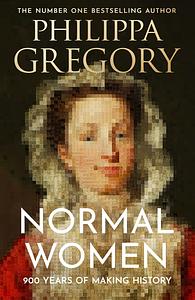Take a photo of a barcode or cover
informative
sad
slow-paced
This fails at almost all count to be a good piece of History.
Gregory has compiled an impressive database of lots of women in English History. However, so much of that evidence is skimmed over so quickly that there is little to no meaning to be made from it. There is barely any analysis of the "national-story" that she aimed to include women within.
Her work does a good job of showing how men have designated what a woman is over time but this key narrative feature was lost in amongst seemingly pointless interludes of some random examples of women in sport or one example within 150 years of a cross-dressing woman that left me as a reader confused as to why they were included if you're not going to do anything with the evidence.
I teach many pupils who write like Gregory in this book. They provide evidence and don't actually write any interpretation with it. This is more of a reference book than a work of History.
The skimming of women who I was originally excited to read about became so incredibly boring. I wanted depth to these women but the scale of this longue durée meant that there was a disregard for their lives and individuality that I found somewhat insulting to their memory. They almost became what Gregory was fighting back against - women were becoming footnotes.
There are many important and eye-opening ideas in the book, many from the latter chapters. I specifically thought the section on rape in the 20th century enlightening and her argument (there is some granted) that women were given the vote so working men couldnt be above elite women. But there are many glaring repeated myths that were annoying.
1) Anglo-Saxon England was some equal utopia before 1066 - nonsense
2) The Enlightenment said there were two sexes - Gregory contradicts herself on this within her work and it is a pure oversimplification
3) The British Empire being an all-English affair which completely
The chapters have somewhat defined dates if you have a wider reading knowledge of English History but so many times I found the dates arbitrary and she ignored them herself which left me confused as the reader. But this fits with the wider sense that she didn't actually know what she wanted to write with this book.
The final chapter was very wishy-washy. Her Afterword actually was okay given the tedious 560 pages of trawling to get there, but only if you ignore the added information of her views on gender which felt like a bolt on.
Had Gregory kept a clear narrative of how women have been defined through English History, it would have been much better. How any History editor allowed her to keep naming woman after woman without fleshing them out or actually making a point in many sub-sections, I'll never know.
I kept going for my desire to see Women's History written well, but it didn't. I wanted an inclusive History and didn't really get it. If you want good History books that are actually authentic feminist or at least inclusive works then I'd recommend:
The Five, Hallie Rubenhold
Femina, Dr Janina Ramirez
The Restless Republic, Anna Keay
River Kings, Dr Cat Jarman
A Village in the Third Reich, Julia Boyd
Beyond The Wall, Katja Hoyer
Gregory has compiled an impressive database of lots of women in English History. However, so much of that evidence is skimmed over so quickly that there is little to no meaning to be made from it. There is barely any analysis of the "national-story" that she aimed to include women within.
Her work does a good job of showing how men have designated what a woman is over time but this key narrative feature was lost in amongst seemingly pointless interludes of some random examples of women in sport or one example within 150 years of a cross-dressing woman that left me as a reader confused as to why they were included if you're not going to do anything with the evidence.
I teach many pupils who write like Gregory in this book. They provide evidence and don't actually write any interpretation with it. This is more of a reference book than a work of History.
The skimming of women who I was originally excited to read about became so incredibly boring. I wanted depth to these women but the scale of this longue durée meant that there was a disregard for their lives and individuality that I found somewhat insulting to their memory. They almost became what Gregory was fighting back against - women were becoming footnotes.
There are many important and eye-opening ideas in the book, many from the latter chapters. I specifically thought the section on rape in the 20th century enlightening and her argument (there is some granted) that women were given the vote so working men couldnt be above elite women. But there are many glaring repeated myths that were annoying.
1) Anglo-Saxon England was some equal utopia before 1066 - nonsense
2) The Enlightenment said there were two sexes - Gregory contradicts herself on this within her work and it is a pure oversimplification
3) The British Empire being an all-English affair which completely
The chapters have somewhat defined dates if you have a wider reading knowledge of English History but so many times I found the dates arbitrary and she ignored them herself which left me confused as the reader. But this fits with the wider sense that she didn't actually know what she wanted to write with this book.
The final chapter was very wishy-washy. Her Afterword actually was okay given the tedious 560 pages of trawling to get there, but only if you ignore the added information of her views on gender which felt like a bolt on.
Had Gregory kept a clear narrative of how women have been defined through English History, it would have been much better. How any History editor allowed her to keep naming woman after woman without fleshing them out or actually making a point in many sub-sections, I'll never know.
I kept going for my desire to see Women's History written well, but it didn't. I wanted an inclusive History and didn't really get it. If you want good History books that are actually authentic feminist or at least inclusive works then I'd recommend:
The Five, Hallie Rubenhold
Femina, Dr Janina Ramirez
The Restless Republic, Anna Keay
River Kings, Dr Cat Jarman
A Village in the Third Reich, Julia Boyd
Beyond The Wall, Katja Hoyer
dark
emotional
informative
inspiring
reflective
sad
medium-paced
informative
fast-paced
slow-paced
informative
inspiring
reflective
slow-paced
A comprehensive history of "the nature of women" in British history. Gregory's examination of everyday "normal" women is refreshing and a departure from history books that only feature the successful outliers of history - the powerful and famous women. While her book does touch on these women (Anne Boleyn, Joan of Arc, Queen Victoria to name a few), most of the stories delve into the average lives of women, dissecting current power structures by examining the root histories of patriarchy and when women became relegated to less than. An essential read.
informative
A very informative book - I appreciate Gregory’s take. This book fills a gap about the regular women who didn’t or couldn’t record their lives.
informative
inspiring
fast-paced
informative
slow-paced



